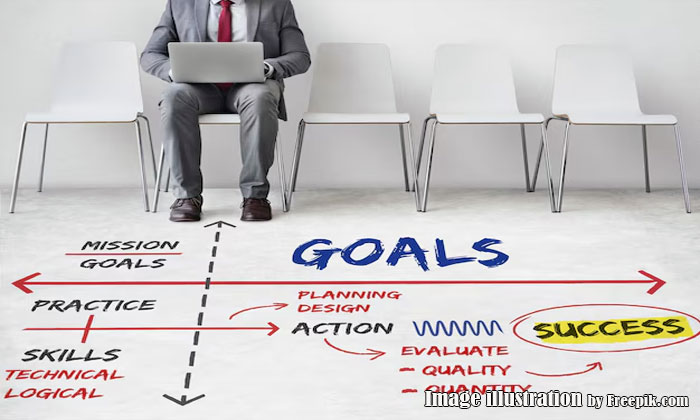
Setting clear career goals is one of the most effective ways to stay motivated, focused, and on track in your professional life. Whether you’re just starting out in your career, looking to advance in your current role, or considering a career change, having well-defined goals can guide your actions and help you reach your full potential. However, setting career goals isn’t just about dreaming big—it’s about creating a roadmap that will allow you to reach your desired destination. Here’s how to set clear career goals and achieve them.
1. Define Your Long-Term Vision
The first step in setting clear career goals is to have a long-term vision of where you want to be. This vision will serve as the foundation for all of your goals and help you prioritize your efforts. Take some time to think about what you truly want from your career. Ask yourself:
- What are my passions?
- Where do I see myself in 5-10 years?
- What kind of work environment or company culture do I want to be a part of?
- What impact do I want to make through my work?
By envisioning your ideal future, you can create a sense of direction that will guide your career decisions. This long-term vision is the “big picture” goal that will be broken down into smaller, more actionable steps.
2. Break Down Long-Term Goals into Short-Term Objectives
Once you have a clear vision of where you want to go in your career, break that vision down into manageable, short-term goals. These are specific, actionable steps that will help you make progress toward your long-term goal.
- Make your goals specific: Rather than a vague goal like “get a promotion,” a more specific goal could be “apply for a managerial position within the next 12 months.”
- Set measurable goals: Being able to track your progress is crucial for motivation. For example, you might set a goal to complete a specific certification or attend a set number of networking events within the next few months.
- Set realistic deadlines: Give yourself a timeline for achieving each goal. A deadline helps you stay focused and ensures you’re actively working toward your objectives.
By breaking down larger, long-term goals into smaller, achievable steps, you make the process feel less overwhelming and more attainable.
3. Use the SMART Goal Framework
A great way to ensure your career goals are clear and achievable is to use the SMART goal framework. SMART stands for:
- Specific: Your goal should be clear and specific, addressing the who, what, where, when, and why.
- Measurable: You should be able to track your progress and measure success.
- Achievable: The goal should be challenging but realistic, based on your current skills and available resources.
- Relevant: Your goal should be aligned with your long-term career aspirations.
- Time-bound: Set a deadline for achieving the goal, ensuring you stay focused and accountable.
Using the SMART framework helps you create goals that are not only clear but also actionable and measurable, increasing your chances of success.
4. Align Your Goals with Your Values
It’s important that your career goals align with your personal values and motivations. If your goals are based on external expectations or societal pressures, you may find yourself unmotivated or dissatisfied. To create meaningful career goals:
- Identify your values: Reflect on what matters most to you in your work life, such as work-life balance, creativity, financial stability, or opportunities for growth.
- Match your goals to your values: Ensure that the career objectives you set reflect what you truly want, not just what others expect from you. For instance, if having a flexible schedule is important to you, you might set a goal to pursue a remote or freelance career.
Aligning your goals with your values will help you stay motivated throughout the process, making the journey toward achieving them more fulfilling.
5. Create a Detailed Action Plan
Once you’ve set your goals, it’s time to create a detailed action plan to help you achieve them. A solid action plan outlines the specific steps you need to take to move forward.
- Identify resources: Determine what resources you need to reach your goals. This could include additional education, mentorship, or networking opportunities.
- Break down tasks: Break your action plan into smaller, manageable tasks that can be completed daily, weekly, or monthly. This makes the process feel less overwhelming and keeps you on track.
- Prioritize tasks: Not all tasks are equally important. Prioritize the ones that will have the greatest impact on achieving your goal.
- Schedule regular check-ins: Set up regular checkpoints to track your progress, assess any challenges you’re facing, and adjust your plan if needed.
An action plan helps you stay organized and accountable, ensuring that you remain focused on the path to achieving your goals.
Also read other self development articles on Destyless:
- How to Turn Your Hobby into a Career
- Exploring the Fastest-Growing Careers in 2024
- How to Set SMART Goals for Your Career Growth
6. Develop the Necessary Skills and Knowledge
To achieve your career goals, you may need to develop or strengthen certain skills. Take an inventory of the skills that will help you reach your goals and identify areas for improvement.
- Take courses or earn certifications: Depending on your career goals, you might need additional qualifications or knowledge. Look for online courses, certifications, or workshops that can help you gain the expertise required for your next step.
- Learn on the job: Sometimes, the best way to develop new skills is through hands-on experience. Look for projects or opportunities in your current job that will allow you to develop the skills needed for your future goals.
- Seek mentorship: Mentors who have experience in your desired career path can provide valuable insights, advice, and guidance. Having someone to support and challenge you can accelerate your growth and help you avoid common mistakes.
Investing in your professional development will not only help you achieve your goals but also prepare you for future opportunities.
7. Stay Flexible and Adjust Goals as Needed
While it’s important to set clear goals, it’s equally important to stay flexible. Life and career paths are rarely linear, and sometimes things don’t go as planned. Don’t be discouraged if you face setbacks or if your goals change.
- Evaluate progress regularly: Periodically assess your goals to ensure you’re still on track. If things aren’t working, figure out why and make adjustments as needed.
- Be open to new opportunities: Sometimes, your career path may take unexpected turns. Be open to new roles, industries, or opportunities that align with your long-term vision.
- Learn from setbacks: Don’t be afraid to fail. Each setback is an opportunity to learn and grow. Use any challenges you face as stepping stones toward achieving your ultimate goal.
Remaining adaptable and learning from your experiences will keep you motivated and ensure continued progress in your career.
8. Celebrate Milestones Along the Way
Achieving career goals is a journey, not a destination. Along the way, take time to celebrate small victories and milestones.
- Acknowledge progress: Whether it’s finishing a certification, landing a new job, or receiving positive feedback, celebrate each achievement, no matter how small.
- Reward yourself: Rewards can be a powerful motivator. Give yourself a treat when you hit a major milestone—whether it’s a weekend getaway, a special dinner, or something that brings you joy.
Celebrating your progress keeps you motivated and helps you stay focused on your ultimate career goals.
Conclusion
Setting clear career goals and creating a plan to achieve them is an empowering process that can help you stay focused, motivated, and productive. By following the steps outlined in this article—defining your long-term vision, breaking down goals, using the SMART framework, aligning your goals with your values, and taking consistent action—you can set yourself up for career success. Remember, career growth takes time, effort, and resilience, but with clear goals and a structured plan, you can make meaningful progress and achieve the career you’ve always dreamed of.






